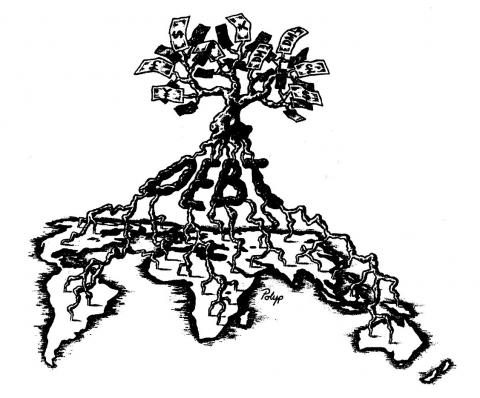
As a member of CIDSE, a coalition of Catholic social justice organizations, the Maryknoll Office for Global Concerns endorses this call for debt cancellation and financial support for the world's most impoverished countries in advance of the upcoming G20 Finance Ministers Meeting.
February 23, 2021
At the start of the COVID-19 pandemic in February 2020, Pope Francis was quick to call for immediate debt cancellation: “It cannot be expected that the debts which have been contracted should be paid at the price of unbearable sacrifices. In such cases it is necessary to find – as in fact is partly happening – ways to lighten, defer or even cancel the debt, compatible with the fundamental right of peoples to subsistence and progress.”
Today, the words of the Holy Father are as relevant as they were then. As well as the tragic loss of life, COVID-19 has stretched healthcare systems in many poor countries beyond breaking point, left millions of people without jobs and livelihoods, and decimated economies. It has exacerbated existing inequalities; whereby more powerful countries can use their position and power to secure access to vaccines and support their own economic recovery. It has compounded the challenges for many countries that were struggling with the impacts of climate change.
The immediate priority for all countries is to save lives and support livelihoods, and debt cancellation is the quickest way to finance this. In the long-term, permanent debt restructuring and new finance is needed to rebuild societies and economies that put the needs of the poorest and most vulnerable people first, care for our common home, and tackle the climate crisis.
We need to act in global solidarity as one human family, moving from a myopic focus of what is politically, financially and technically feasible, to concentrate on what is necessary to save lives and protect our planet for current and future generations.
As Catholic Social Justice organisations we therefore call on G20 Finance Ministers to respond to the urgency of the current crisis with global cooperation, solidarity and leadership that is needed:
1. To support a new and significant issuance of $3 trillion Special Drawing Rights (SDRs) by the IMF, that will enable all countries to respond to the current Covid crisis and support a just, sustainable recovery.
2. To extend the debt moratorium through the DSSI (Debt Service Suspension Initiative) for longer (at least 4 years) and to more countries, including those climate vulnerable countries who were already struggling to respond to added pressures of climate change.
3. To ensure that private creditors – who are currently continuing to take debt payments from countries who are struggling to respond to the needs of their citizens - are compelled to participate in all debt restructuring and debt relief.
4. To support a permanent debt workout mechanism to deliver timely, comprehensive, and fair debt restructuring to all countries with a high and unsustainable debt burden, without conditionality.
